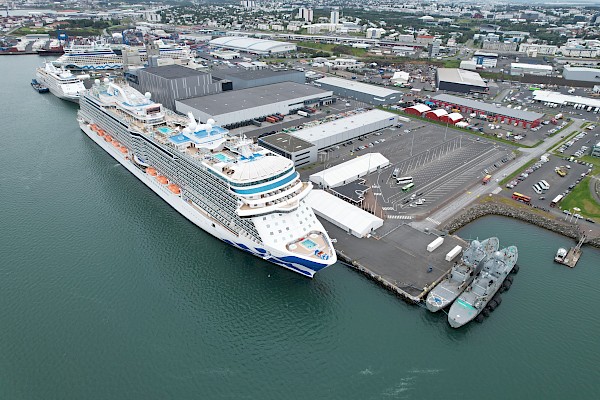The EPI is implemented in Reykjavik in 2023
 Beginning 2023, cruiseships calling Faxaports/Associated Icelandic Ports’ Reykjavik will be assessed according to The Environmental Port Index (EPI), a tool that allows ports to define the environmental footprint of cruiseships during a call.
Beginning 2023, cruiseships calling Faxaports/Associated Icelandic Ports’ Reykjavik will be assessed according to The Environmental Port Index (EPI), a tool that allows ports to define the environmental footprint of cruiseships during a call.
“The implementation of the EPI is in line with Faxaports strategic pillar regarding green ports and its strategy to take on an environmentally leading role in port – and maritime operations,” says Sigurdur J Olafsson, marketing manager of Faxaports.
The goal is to establish a financial incentive system for a more environmentally-friendly and sustainable operation of cruiseships. Data for assessment of environmental performance in port must be submitted no later than 72 hours after departure.
Based on that data, each ship receives an EPI score between 0 (worst) and 100 (best). If a ship does not submit data, it will automatically receive a score of 0. An EPI rating provides a maximum 17.5% discount on quay dues and a maximum 75% surcharge. Quay dues will take on a proportional change for EPI scores below and above 30.
In terms of cruiseline feedback to the scheme, Olafsson says: “In general there has been good feedback since environmental matters are part of their strategy and furthermore end customers increasingly look towards environmental matters in their purchasing.”
With its emphasis on sustainability, ISO 14001 environmental-management certified Faxaports is implementing a number of further initiatives. In spring 2023 it is taking into operation shore power connection for the smaller cruiseships calling the Old Harbour in Reykjavik. Shore connections for larger cruiseships are planned during the next six years.
The terminal building in Skarfabakki planned for 2024-2025 is to be BREEAM certified. Led light implementation on all quays is taking place and the majority of port vehicles run on renewable energy.
The quay extension in Akranes, which will accommodate ships up to 220m, will be made with 100% recycled steel.
Faxaports, which were CO2 neutral in 2021, has a strategic plan that is based on three pillars: safe, green and effective ports. Olafsson says the goals in this respect include: improving waste disposal management; more efficient use of natural resources; increasing carbon offsetting; increasing environmental protection awareness; improving air quality in harbour areas; and increasing the ratio of clean energy usage.
(Faxaports/Associated Icelandic Ports’ Reykjavik)


